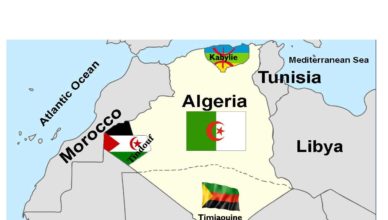Several analysts are focusing on the concept of dividing Algeria into three autonomous states, a proposal that has been widely discussed behind the scenes in political and academic debates.
According to Western observers, statements made by General Saïd Chengriha, Chief of Staff and Deputy Minister of Defense to President Abdelmadjid Tebboune, during the appointment of Major General Mostefa Smaili (former Commander of the 3rd Military Region/Béchar) on November 20 as the new commander of the Land Forces, replacing Major General Amar Athamnia, confirm that the situation is beginning to deteriorate within the military institution and in the southern regions of Algeria, such as Timiaouine, Tamanrasset, and Tinzaouaten.
Divisions between regions, particularly Kabylie, the Saharan areas, and major coastal cities like Algiers, have fueled debates on governance structures. However, no formal division was established following independence.
Although Algeria has chosen to remain unified, several movements are calling for greater regional autonomy or even independence. These demands primarily concern three regions.
Kabylie has expressed aspirations for autonomy and a stronger recognition of the Berber language and culture. The Movement for the Self-Determination of Kabylie (MAK), which advocates for the region’s independence, is an example of these demands.
In the south, the vast Saharan territory, home to the Tuareg and Azawad, has also been the subject of such claims. Rich in natural resources, particularly oil and gas, the Saharan region has historically been poorly integrated into Algeria’s political and economic system.
As for the coastal regions, Algiers and other major cities along the Mediterranean coast have historically been centers of power and economic concentration. At times, the idea of decentralized governance has been discussed, where the capital could have greater autonomy compared to more remote areas.
Some analysts and political leaders consider that dividing Algeria into three autonomous states, or establishing a federation, would be important for national unity.
Today, issues of governance and decentralization remain relevant, especially with the rise of identity movements, such as those in Kabylie and the south, among the Tuareg and Azawad populations.

